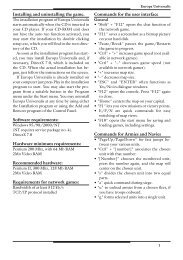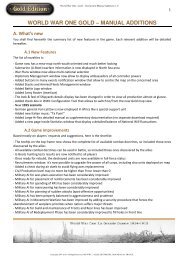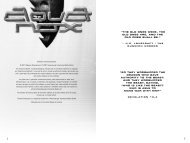Create successful ePaper yourself
Turn your PDF publications into a flip-book with our unique Google optimized e-Paper software.
If your proposal is sincere, a Peace Test is rolled. The peace will be<br />
accepted or rejected irrespective of what your opponent thinks or wants<br />
(yet, he may influence this decision).<br />
If your proposal is a bluff, no Peace Test is executed. The real purpose was<br />
to “trap” the enemy, and make him lose NW.<br />
NB: On the Western Front, no Separate peace is possible, only an<br />
unconditional surrender.<br />
27.2.3 Diplomatic Goals<br />
Being “sincere” enables you to get a Separate Peace Test, with a penalty if<br />
your opponent answered yes, but with no penalty if he answered no. Yet,<br />
getting peace is difficult, and you lose NW if you fail.<br />
If your opponent answers no, the United States level goes up by 1 (if you<br />
are Central Powers) or down by 1 (if you are Entente).<br />
A "bluff" allows you to decrease your opponent’s NW, if he has accepted to<br />
negotiate (he fell into your “trap”).<br />
If you bluff and your opponent answers no, nothing happens.<br />
Therefore, the Enemy usually should reject any negotiations, to prevent a<br />
bluff (and a loss of NW).<br />
On the other hand, accepting the negotiations gives a better chance<br />
to prevent a Separate peace, because the more people around<br />
the negotiating table, the less probable the prospects for a Separate<br />
peace.<br />
If France and Britain help Russia, by launching offensives or giving an<br />
Economical Aid, chances of a Separate peace are reduced. Same thing if<br />
Germany helps Austria-Hungary.<br />
If Russia or Austria-Hungary accepts the peace (successful test), the treaty<br />
is a White peace or a Victorious peace (in your favor). This is not an<br />
unconditional surrender. The peace brings you fewer VPs.<br />
**Note: there are penalties and bonuses during the check.<br />
25.2.4 NW Bid and Separate Peace<br />
If your peace offer is a sincere one, a Peace Test occurs.<br />
If the peace is accepted (successful test), the National Will receives a<br />
random bonus/penalty, both for the winning side (bonus) and the losing<br />
side (penalty). In case of failure, the penalty values is worse.<br />
Seperate Peace with Russia<br />
A Separate peace is possible only if a Russian city (any, e.g. a Polish city)<br />
has been conquered by Central Powers.<br />
Bids: Germany/Russia<br />
Test is on one D12. On a 9+, Russia accepts to sign a separate peace with<br />
the Central Powers.<br />
Modifiers: consider the current year only<br />
-2 the opponent answered “yes” (France and Britain take part in the<br />
negotiations)<br />
-1 if 2+ Russian cities are occupied.<br />
-1 Allied Grand Offensive on the French Front, at least 2 rounds<br />
-1 per additional turn, starting with the 4th turn of the Allied<br />
Offensive<br />
-1 the Western Powers have given 40 EP to Russia (current year)<br />
-1 city or former fortress (German or Austrian) controlled by Russia<br />
+/-? Russian Parliament (reverse the value: -1 becomes +1, etc)<br />
+1 Russian defeat during a German Grand Offensive on the Eastern<br />
Front<br />
+1 Petrograd or Paris controlled by the German player (+2 both)<br />
+1 Russia’s regime is M or -2 if Kornilov leads Russia<br />
+1 Sixte de Bourbon-Parme event has occured<br />
If the test fails, Germany loses NW -1 (in addition to her bid). Peace is not<br />
signed yet.<br />
If the test succeeds, Russia signs the peace agreement. The effects below<br />
apply.<br />
World War One: La Grande Guerre 1914-1918 137
















